As the performing arts world still reels from prolonged, pandemic-induced closures, a pair of 34-year-old entrepreneurial Washington pianists have brought to life their long-held dream of an innovative concert series. “This might be our only shot for this year,” Christopher Schmitt recalled thinking in the leadup to the Washington Arts Ensemble’s September 17, 2021, inaugural concert, concerned about possible future shutdowns. But in its first three months, the chamber music group he launched with fellow Juilliard alum Natalia Kazaryan has already sold out monthly performances to an enthusiastic audience that keeps clamoring for more.
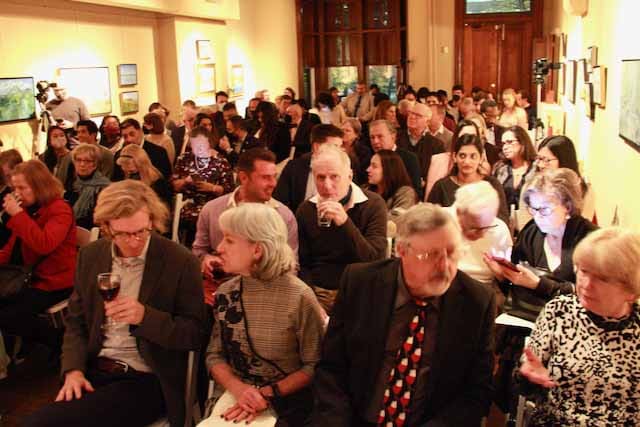
It’s an unusual turnout for a newcomer to a classical music scene that has a well-known audience problem—the public trends whiter and older, and concert halls struggle to fill their seats. At least, so we are told. Washington Arts Ensemble offers a glimpse of what the future could look like for these centuries-old forms: a diverse crowd packing a venue where young and old mingle and share a passion or curiosity for classical music. “We deliberately market to people of different age groups,” Schmitt explained. “I find that with almost everybody, they prefer to have some level of diversity in the audience for their own stimulation.”
Washington is a city filled with classical music series even beyond the Kennedy Center, from those with long histories (nearly a century at the Library of Congress, 75 years at Dumbarton Oaks, a bit more at the Phillips Collection) to recent arrivals (the New Orchestra of Washington, Constellations Chamber Concerts, or the Boulanger Initiative’s women composers festival, to name a few). So what’s the secret sauce for a fledgling group to cut its teeth and make its mark?
Much of it has to do with breaking down barriers to a music genre often perceived as inaccessible and elitist. The ensemble’s tickets are priced reasonably, ranging from about $15 to $45 apiece, and the shows offer a communal experience where the artists themselves interact with the audience by socializing and introducing the music. “I don’t know of any place that is fantastic at both those things, that is at the upper echelons in terms of quality and also has this audience component as good at the best,” said Schmitt, a member of the U.S. Marine Band who has performed in the U.S. and abroad.
Here, both the uninitiated and aficionados are welcome; a jazz enthusiast snaps pictures of the performance and claps between movements while a concert veteran revels in the high-charged interpretation. As she opened a November concert by introducing Mozart’s Piano Quartet No 1 in G minor, Kazaryan surprised both the audience and the performers by asking the string players to join her in transposing the first few bars in a major key on the spot. It sounded rather charming, but a world apart from the original minor key. This little exercise primed the ears of those seated for a new understanding and appreciation of the piece in its original form.
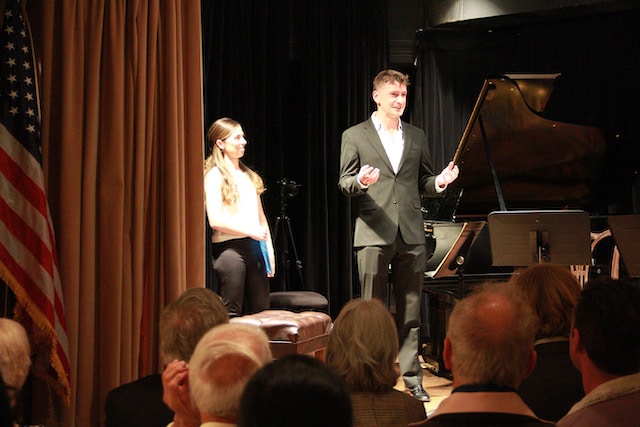
Kazaryan, violinist Laura Colgate, violist Jacob Shack, and cellist Loewi Lin bounced off one another intuitively in a fiery performance after just a couple of rehearsals together. “The exact way that’s done—you can’t dictate it,” Schmitt said. “It’s both following and leading, simultaneous and consistent for all four of us. Little tiny indications, it’s all intuition.”
The concerts burn with the spirit of chamber music, a form that emerged in full force in the late 18th century and was originally intended to be played by small groups in a home’s room (or “chamber”) for the enjoyment of other musicians and listeners. At the Arts Club of Washington—a lavishly furnished historic mansion where President James Monroe once lived—the ensemble’s concerts take place in the Monroe Gallery, a converted parlor that can seat around 90 guests. Economists and policymakers rub shoulders with students, connect over drinks and fine hors d’oeuvres, experience live music together, and meet again afterward to engage with the artists themselves.
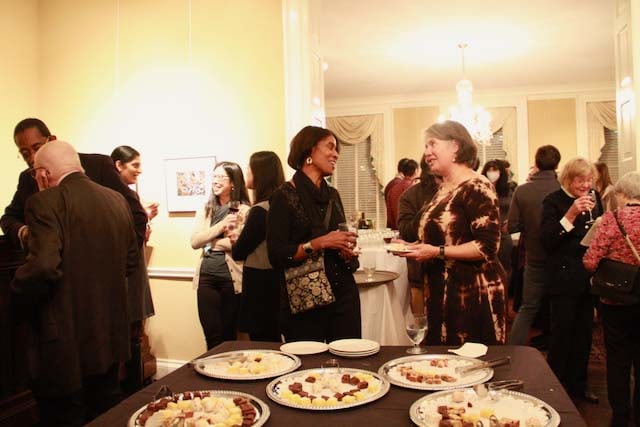
The programming also reflects the founders’ ambitions of accessibility, mixing repertoire staples with lesser-known works, including some by women. An October concert featured three piano trios, with Rebecca Clarke’s richly textured E flat minor piece closing out an evening that included Claude Debussy’s teenaged venture into the form and Beethoven’s subtle Op. 70 No. 2 work in E flat Major. “People will get what they love, but they will also learn something new. That’s really important for us, that balance of programming: honoring tradition while also introducing the public and also ourselves” to less familiar repertoire, said Kazaryan, who grew up in Georgia in the Caucasus region that straddles Europe and Asia. As a soloist performing across the U.S. and Europe, the Howard University adjunct professor has also championed works by women.
Schmitt noted concertgoers’ enthusiasm about their separate performances of Clarke’s trio and Nadia Boulanger’s Three Pieces for Cello and Piano. “We’re unapologetic about playing Mozart and Brahms. But we also demonstrate that we are committed to the music of minorities, and we show that in the majority of our programs,” Kazaryan explained. “The pieces by women, they belong on the program because they can hold their weight—and that’s the only reason they are there. It’s not to check a box.”
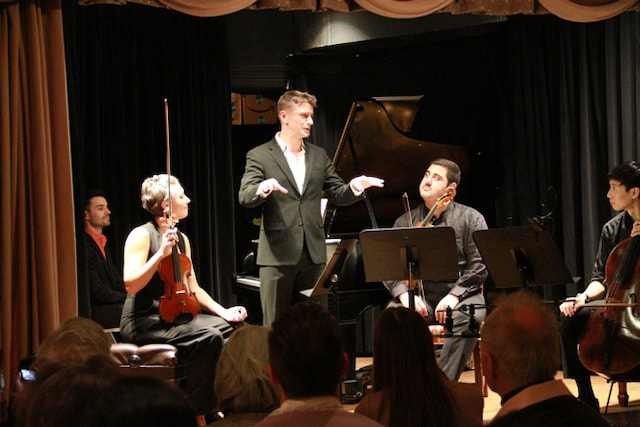
The ensemble is still very much in beta mode in this early phase of its adventure. “It’s word of mouth at this point, but we will take our marketing to the next level and keep trying to spread the word to appeal to different areas, different demographics, because there’s something for everybody,” said Kazaryan. The ensemble rents out the Arts Club, which takes a percentage of ticket sales but also pays for half of all recordings provided as a digital alternative, in a mutually beneficial arrangement that’s as much investment as sponsorship. The first concert was live-streamed in collaboration with The Violin Channel (see below).
While awaiting nonprofit status, the group accepts donations via the Arts Club and fundraising platform Fractured Atlas, its founders take no pay, and the budget is just tens of thousands of dollars. But the ensemble is already dreaming big, with plans to extend beyond the Arts Club to offer performances in larger concert halls, museums, private homes, and outdoors, as well as educational programs.
In addition to performing, the two pianists also run the show, doubling as arts administrators. The flexible ensemble has vowed to provide generous compensation for its rotating set of string players and lyric artists from the outset. “One thing that makes us unique as musicians and musician-administrators is that we’re very savvy with finances and expenses,” Schmitt said, noting that the group needs donations to cover only about 25 percent of operating expenses. “We really want to pay our musicians very well. That’s very important to us because we want to have a very high level and also just be respectful of someone’s time.”
Being small makes the group very nimble. So when a fire broke out just days before Thanksgiving in the Arts Club’s kitchen, forcing the venue to exceptionally close its doors through January, Schmitt and Kazaryan were able to quickly pivot to hosting their next concert at a private home. The December 10 song recital features mezzo-soprano Chrystal E. Williams, who made a celebrated Metropolitan Opera in the 2019–2020 season as Maketaten in Philip Glass’s Akhnaten. She will perform a number of Lieder, or art songs, with Kazaryan at the piano. The pieces range from Robert Schumann’s Frauen-Liebe und Leben, based on a set of love poems from a woman’s perspective, to Brazilian folkloric songs composed by Ernani Braga and “You Can Tell the World” by Margaret Bonds—one of the first Black composer-performers to gain widespread U.S. recognition.
The concert will mark the first of what the group is dubbing “S Street Salon” events, in a nod to the eponymous Washington gatherings of Harlem Renaissance intelligentsia that featured the likes of Langston Hughes and Anne Spencer. Hosted at the pianists’ own homes and those of their friends, these more intimate gatherings will still be bookended by cocktail receptions, but with just about 40 spots available.
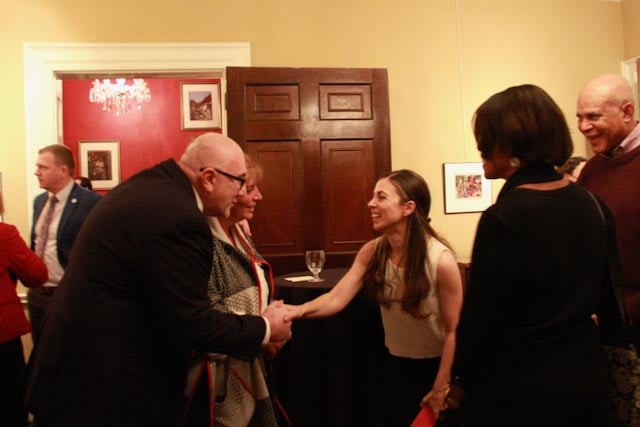
Throughout their endeavors, Kazaryan, Schmitt, and their colleagues share an unrelenting and infectious passion for what they do as musicians. “Playing that kind of music is why I get up in the morning,” Schmitt told a packed room before launching into the Brahms Piano Quartet No. 3 in C minor during the November concert. He explained how Brahms injected a great deal of subjectivity and personal expression into classical forms of an earlier era, while also describing the call and response between strings and piano that characterizes much of the piece.
The third movement is “just so breathtakingly beautiful,” Schmitt said. Indeed, there were quite a few wet eyes during the prolonged cello solo. “The second that movement starts, I don’t care if I literally light the piano on fire for the last movement,” Schmitt said in an interview days after the concert. “Time stops and nothing else matters.”
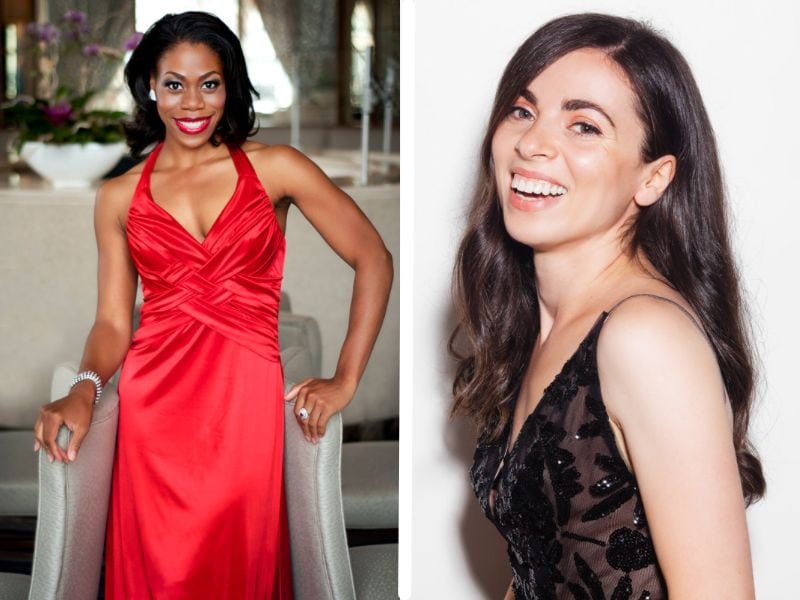
The Washington Arts Ensemble‘s next monthly concert will be an evening of Lieder, featuring breakout mezzo-soprano Chrystal E. Williams and pianist Natalia Kazaryan on December 10, 2021, at S Street Salon, 1919 S Street NW, Washington, DC. Tickets are available online.




